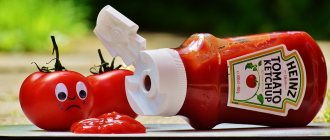Symptoms of flatulence
How to determine that a child has increased accumulation of gases and air in the intestines?
- The baby is nervous and behaves restlessly for no apparent reason (no fever, just ate, diaper is clean).
- The child presses his knees to his stomach, cries and cannot calm down.
- Cries and screams in the evening and at night, although he ate and slept well during the day and morning.
- It loudly emits gases with an unpleasant odor, after which it calms down for a while.
- The child turned pale.
- The baby begins to worry and cry 5 to 10 minutes after eating.
- Constipation or loose, greenish stools.
Causes of gas in infants
The accumulation of gases in a child’s intestines is provoked by a number of factors:
- Incorrect attachment to the breast if the baby is breastfed. The baby should completely grasp the nipple along with the areola. If you hear your baby smack his lips, he is swallowing air. For the “artificial” ones, you need to choose the right bottle. The mixture should not flow with great pressure through the hole in the nipple, otherwise the baby will rush and again swallow air. Also, he should not make too much effort trying to get food. If you turn the bottle over, one drop should flow out per second;
- Overeating, when food does not have time to be absorbed and accumulates in the intestines;
- Consumption of foods that cause gas formation. If the baby is fed breast milk, then the mother should also monitor her diet;
- Dysbiosis, in which the composition of the intestinal microflora is disrupted. Beneficial bacteria are in the minority, which increases fermentation and flatulence;
- Lack of enzymes, which is often observed in infants when adapting to the environment, imperfect functioning of the digestive system.
Mom's diet after childbirth
A woman feeding her baby with breast milk is allowed to eat the following foods in the first month after birth:
- cereals: buckwheat, rice, millet, barley porridge, pearl barley;
- any (except legumes) vegetables that have undergone heat treatment;
- boiled, stewed, baked low-fat meat;
- vegetable broth soups;
- fermented milk products of medium fat content (kefir, cottage cheese, fermented baked milk, cheeses, yoghurts);
- compotes from fruits and dried fruits;
- boiled and baked potatoes;
- baked apples, bananas, pears;
- white bread (preferably stale).
After the child is 1 - 1.5 months old, the following products are allowed to be gradually added to the diet:
- oatmeal with milk, millet porridge;
- boiled chicken and quail eggs;
- boiled or stewed chicken breast (add carefully, like eggs);
- boiled fish, steamed fish (low-fat varieties, preferably white river fish).
As soon as the baby is 3 months old, the mother is allowed to eat any food, adding it to her menu little by little and monitoring the baby’s reaction.
Foods that cause gas in infants
If a child has flatulence, it is necessary to review his mother's menu. A direct connection between the composition of breast milk and a woman’s nutrition has been scientifically proven. If a mother eats foods that cause her severe gas, the child will also suffer from abdominal pain. So, during the period of breastfeeding (at least for the first 3 months, after which prohibited foods can be introduced in small doses), a woman is prohibited from eating a number of foods:
- Whole milk can cause lactose allergy. It is undoubtedly possible and necessary to eat fermented milk products; it is better to exclude milk completely.
- Rye (black) bread can be replaced with whole grain diet bread - they contain the same amount of vitamins and minerals, but much less fiber, which causes gas formation.
- Legumes (corn, peas, beans, chickpeas) are a source of vegetable protein. However, during lactation it is necessary to abandon them. Peas and corn can be replaced with soy cheese.
- Fresh, pickled and canned vegetables and fruits. Such products are allowed to be boiled and baked. The lack of vitamins is compensated with the help of vitamin complexes.
- White cabbage.
- Yeast dough can cause severe flatulence in a baby, so you should not get carried away with pies during breastfeeding.
- Mushrooms are a source of protein, but they are very difficult for the body to digest and are highly likely to cause flatulence in both mother and child. It is not recommended to eat them until the end of lactation.
What should a nursing mother not eat?
With increased gas formation and the first symptoms of colic appearing in a newborn, the first thing a nursing mother needs to do is to reconsider her diet. What foods cause gas?
- Black bread. Its production involves a fermentation process, the enzymes of which provoke excessive gas formation, causing colic in a newborn. An excellent alternative to black bread when breastfeeding would be whole grain breads with a high content of vitamin B;
- Whole milk. It contains lactose, which causes gas formation and is poorly absorbed even by an adult body. Cow's milk does not have antigenic properties, so it can cause allergic reactions, which are manifested by bloating and colic. In terms of nutritional effect, plain milk is superior to fermented milk products (ryazhenka, yogurt, kefir), while they are not gas-forming;
- Mayonnaise, hot sauces, ketchup, mustard, as well as anything salty and spicy are foods that cause intestinal irritation. During a nursing mother’s diet, they should be strictly excluded;
- All legumes are exceptional gas-forming crops. These include peas, beans, corn, and lentils. They break all records for protein content, but at the same time provoke the development of severe flatulence. You can replace them with cottage cheese, fish (low-fat), soy cheese. When breastfeeding, their use is possible in any quantity;
- Vegetables and fruits in raw form. They contain a large amount of fiber, which causes flatulence. This is especially true for pickled vegetables (for example, cabbage), cucumbers, grapes and citrus fruits. Before a nursing mother eats vegetables and fruits, they must be steamed, boiled or baked;
- Sweets are also a cause of colic in newborns. During breastfeeding, the mother should deny herself the pleasure of eating sweets and chocolates.
Foods that cause colic in newborns also include all carbonated drinks, coffee and alcohol.
How to alleviate a child’s condition with flatulence?
In addition to eliminating harmful and prohibited foods from the diet, your baby can be helped by the following methods:
- Massage the baby's belly clockwise in a gentle circular motion. Mom's nails should be cut short, and the skin can be moisturized with special baby massage oil.
- Correctly attach the baby to the breast during feeding (the areola should be almost completely captured by the baby, the nipple should point upward).
- Immediately after eating, the child must be held in an upright position - this will facilitate the exit of gases swallowed with milk from the stomach.
- For particularly severe colic, applying a warm heating pad or an iron-warmed diaper to the tummy of a crying baby will be effective.
- Every day for 3 - 5 minutes it is necessary to lay the baby on its stomach. At the same time, you need to keep an eye on the child: he can bury his nose in the bed and suffocate!
- If attacks of flatulence occur to a child too often, it is necessary to contact a pediatrician who will select the appropriate drug to alleviate the condition (Espumizan, Bobotik).
Colic is a common ailment among newborns, occurring in 90% of babies. Therefore, even a completely healthy baby with normal development, good appetite and well-being has colic. This is a normal reaction for a baby’s still fragile intestines, because the body is just getting used to new food and new conditions. Do not be alarmed, over time the disease goes away on its own.
Colic begins already in the first days after the birth of a baby and usually goes away by 2-3 months. Sometimes abdominal cramps disappear only by 5-6 months. During colic, the baby often cries and screams, is capricious, and sometimes sleeps poorly. The baby periodically pulls his legs towards his stomach. In addition, you can observe increased gas formation and stool disturbances (constipation, green mucous stool).
The main cause of colic is improper nutrition of a nursing mother. Often women include foods that cause colic in newborns on the menu, too early, or overeat. Therefore, when breastfeeding, it is important to follow a diet and eat safe, light foods.
Try to exclude foods that cause colic in infants from the menu and monitor your baby’s well-being. And if the problem is in the diet, you will see that the colic will go away on its own in 2-3 days. Let's find out which foods most often cause colic in infants.
The main gas-forming products during breastfeeding and methods of combating flatulence
Problems with the gastrointestinal tract in the mother and her baby in the first few months after childbirth are one of the main causes of concern for a woman. To prevent such a pathology, it is necessary to know the main gas-forming products during breastfeeding.
Naturally, for a woman after giving birth, the health of her baby comes to the fore, so any intestinal problems that arise in the mother or child can become an obsession for the patient. To prevent such situations, specialists must explain all the intricacies of nutrition during this period to a nursing mother.
Basic diet tips for a new mother
Experts consider gas formation in mother and child to be one of the main problems in the early postpartum period. Doctors attribute 80% of such disorders to the unbalanced diet of a young woman.
Modern dietetics has developed a complete list of recommendations for a nursing woman, which will reduce the likelihood of various pathological reactions in the mother and her baby:
- Sufficient fluid intake by a young mother in her diet is considered mandatory. The daily requirement should increase by 1 - 2 liters during this period.
- Specialists in a pediatric consultation should offer the woman a specific diet that corresponds to the calorie loss of her body for 2 to 3 months in advance. The calorie content of foods and the speed of their digestion in the gastrointestinal tract contain the opportunity to prevent excessive gas formation in mother and child.
- Extremely important for proper feeding is the constant attempt by the nursing mother to balance the percentage of proteins, fats and carbohydrates in food. Violation of this proportion often leads to excessive fermentation of products in the mother’s intestines, which can be passed on to the baby through the milk.
- The most important way to avoid gastrointestinal upset in a young woman and her child is to eat regularly and carefully observe feeding times. New-fangled manuals recommend giving breastfeeding to a baby on demand, but this practice is considered by many experts to be quite vicious.
But even if you adhere to these rules, the possibility of gas formation in the mother or baby still remains. A lot depends on the foods that a nursing mother eats.
Foods that cause gas in the intestines
Disorders of the gastrointestinal tract are known to all people. However, if for most patients such disorders bring only minor troubles, then for a nursing mother these problems can become a cause of serious concern.
In medical practice, there are quite a lot of medications that help reduce intestinal turmoil in a baby, but the use of such drugs is far from harmless, so it is best for a young mother to adhere to a certain diet.
Prohibited products include:
- First of all, these are any leguminous plants. Peas, beans, beans, and even soy, which is popular after childbirth, can increase fermentation in the intestines of mother and baby.
- During the first few months of breastfeeding, many fruits are contraindicated for a woman, including apples, pears, grapes, and bananas.
- Not all plants grown in one’s own garden can be eaten by patients if they are bothered by the urge to produce excessive gases in the intestines. Carrots, turnips, onions, celery and even mushrooms should be excluded from the diet.
- Any sweet carbonated drinks, fresh white bread and milk are prohibited.
- Concerning vegetable oil, debate continues among experts: many are against its use as food, others recommend this product as a way to combat intestinal and stomach disorders in mothers and children.
- Doctors consider cabbage of any variety to be the most dangerous vegetable for a young mother. Many nutritionists offer a nursing woman cauliflower or a variety of broccoli almost from the first days after childbirth. However, recent studies have confirmed increased gas formation in the intestines of mother and child after eating this vegetable.
Flatulence during breastfeeding is a fairly serious problem. And it is the use of the listed products for the daily diet of a nursing woman immediately after childbirth that can lead to a similar problem. A nursing mother should limit herself to lamb or veal, fish, eggs and potatoes in the first few months of lactation. Such products do not lead to the formation of excess gases in the patient and child; a dietitian should recommend such a diet to the young mother.
Diet of a nursing woman: how to avoid problems
It should be noted that not only certain vegetables or fruits cause excessive gas formation in the intestines of the mother or baby, but also a combination of completely neutral substances. Therefore, a nursing woman should always consult a specialist before introducing certain foods into her diet.
It has long been noted that the simultaneous consumption of foreign foods causes certain discomfort. If such a condition quite often provokes problems in people in everyday life, then disorders of the gastrointestinal tract in a nursing mother can cause quite serious complications.
A young woman should be wary of the following combinations:
- It is not recommended to eat various legumes and fresh wheat or wheat bread at the same time. It should be noted that if wheat varieties are included in the food, intestinal upset may occur 2 times more often.
- Women during lactation are completely prohibited from any carbonated drinks, especially Pepsi and Cola. The combination of sugar and carbohydrates is harmful to the health of patients, and since soda is based on chemicals, the poisoning of the body does not depend on the food that the lady washed down with such a potion during lactation.
- Fried meat dishes, especially those prepared with various spices, in combination with sweet homemade compotes and fruit drinks, are completely unsuitable for feeding a nursing mother. Carbohydrates and proteins always cause flatulence in patients, and in a nursing mother, a similar problem can spread to the baby.
- It has long been known that various dairy products cannot be combined with meat products, fish or vegetables. Everyone knows about the possible consequences of simultaneous consumption of milk and cucumbers. And this is far from the only example.
Modern nutrition systems for nursing mothers suggest leaving all dairy drinks for the last hour before bed to stimulate the release of breast milk. And it is advisable to remove all sweet drinks from a young woman’s diet before the child reaches 6 months.
The lack of carbohydrates in the mother’s body is quite easy to compensate for with other products, but problems with the gastrointestinal tract in the mother and child can cause a delay in the baby’s development and early refusal of breastfeeding. To prevent such complications, modern medicine offers a wide range of medications.
Watch the video about nutrition for a nursing mother:
How can a pharmacy help with flatulence in mother and baby?
Most often, a young mother copes with intestinal bloating by changing her diet and selection of foods. However, there are situations when medical intervention is required to solve such a problem.
In such situations, doctors advise:
- The most common drug allowed during breastfeeding is Linex. This medicine enhances the growth of intestinal microflora of both mother and child, thereby preventing the formation of gases. It should be noted that this product is created on the basis of natural plant components.
- As one famous advertisement says: “There’s a hurricane in your stomach - take Espumisan.” This product really reduces the formation of gases in the intestines of a woman and baby thanks to its active ingredient - simethicone.
- And, of course, the well-known drug “Hilak Forte”. This medicine is indispensable if the patient has a disruption in the production of beneficial bacteria in the intestines caused by a malfunction in the diet of a nursing woman. This drug helps reduce gas pressure on the intestinal walls of the baby and his mother, thereby reducing the severity of pain and intestinal colic.
Flatulence in newborns during breastfeeding is most often caused by inconsistency between workers in the postpartum department and children's wards. Naturally, childbirth and the associated loss of calories cause a burning appetite in a young mother, which can lead to disturbances in the mother’s diet.
Not all foods are allowed in the first days after the baby is born. It should be borne in mind that even ordinary oatmeal and buckwheat porridge can cause intestinal colic and bloating in a little person.
The coordinated work of the neonatal and postpartum wards is the key to reducing digestive problems for mother and baby. This is reflected in the latest protocols for the work of perinatal centers and maternity hospitals.
Folk remedies for fighting gases during lactation
Treatment of intestinal bloating in nursing women and their children is best started by stabilizing the diet of the young mother. For this purpose, modern medicine has enough developments, which a nursing woman will be introduced to with great pleasure at the antenatal clinic.
However, there are also folk remedies to solve this problem. Traditional healers consider fennel decoction to be the most effective. This well-known plant, in addition to other positive qualities, has a good effect on gas formation in the intestines. The subtlety is that all healthy drinks based on this gift of nature destroy gas bubbles in the intestines, thereby facilitating the passage of feces and relieving pain.
To prepare a folk medicine, 150 grams of dry plant are poured into 0.5 liters of water and brought to a boil. The solution is boiled for 30 minutes, after which it is diluted with running water in a 1:1 ratio.
The recommended dose of the drug for patients is 30 grams 20 minutes before meals at least 2 times a day. After achieving the result, use of the decoction should be continued to consolidate the effect. Usually 2 weeks are enough.
We recommend reading the article about abdominal pain during breastfeeding. From it you will learn about the causes of discomfort in the abdominal area, assistance to a nursing mother and dietary features.
Young mothers immediately after childbirth face a lot of problems, and bloating in the baby or woman is not the worst. However, any disruption of the natural state of a nursing woman during this period can lead to various diseases in the child.
Therefore, the main recommendation if a gastrointestinal disorder occurs in a young mother is to immediately seek help from a doctor. Any self-medication during lactation is fraught with problems not only for the woman, but also for the baby.
GrudInfo.ru
Foods that cause colic
Cow's milk not only causes gas and colic, but also often causes allergies in the child. Therefore, pediatricians do not recommend including such a drink on the menu when breastfeeding for the first 4-5 months. Even porridge should be consumed with water. A nursing mother should never drink fresh milk, as it negatively affects lactation due to its estrogen content.
Therefore, in the first months, it is better for a nursing mother to give up whole cow's milk. However, the drink can sometimes be added to tea in small quantities. Cow's milk is a good substitute for fermented milk products (cottage cheese, cheese, natural yogurt, kefir). You can also drink goat's milk while breastfeeding, as it is safer. But not every mother will like it because of the pungent smell and specific taste.
What foods cause increased gas formation?
Increased accumulation of gases can be observed in the stomach or intestines. In the first case, they come out in the form of belching, in the second they manifest themselves as flatulence. One way or another, the problem requires a mandatory solution. First of all, it is worth understanding which foods contribute to increased gas formation.
As a rule, gases are formed as a result of the activity of bacteria in the intestines, but their amount is determined by the nature of the food and the method of its consumption. So, if you eat quickly and chew poorly, a lot of air will get into the digestive tract along with the food, which will cause the problem to develop. Also, the amount of gas increases when a person consumes large quantities of foods that promote gas formation.
What contributes to increased gas formation?
- Eating foods that promote gas accumulation.
- Binge eating.
- Talking while eating.
- Poor chewing of food.
- Eating food quickly.
- Combination of some incompatible products.
- As a result of an allergic reaction to one of the foods eaten.
In connection with the above, the solution to the problem depends to a large extent on the quality of nutrition. But it’s worth noting right away that it’s unlikely that you’ll be able to completely avoid eating foods that cause gas, since their list is quite wide.
What foods cause gas formation in the intestines?
If increased accumulation of gases in the intestines often bothers you, be sure to review your diet and, if possible, give up the foods listed below or reduce their amount.
- Dairy products. After consuming them, diarrhea and flatulence often occur. This is explained by the insufficient content of lactose in them, an enzyme that ensures normal digestion.
- Legumes. They contribute to this problem due to their complex carbohydrate content.
- Flour products, confectionery products containing yeast, especially black bread, bran.
- Carbonated drinks: mineral water, lemonade, kvass.
- Alcohol.
- Vegetables containing coarse fiber: potatoes, radishes, onions, garlic, tomatoes, spinach, sorrel, white cabbage, turnips, corn, asparagus.
- Some fruits in raw form, in particular apples, prunes, pears, grapes, peaches, cherries.
- Chewing candies, gum.
As a rule, foods that increase gas formation consist of complex carbohydrates, which require the body a lot of effort and time to digest, which causes the problem to develop. These include fatty, fried dishes, for example, pork, lamb, goose. Eating eggs, fatty fish, mushrooms, and sweets can also trigger flatulence.
In some cases, increased accumulation of gases is caused by the presence in the diet of food that is unusual for our climate zone. This is explained by the unpreparedness of the digestive canal to fully process overseas delicacies. These can be pineapples, peaches, bananas and other fruits.
Even if a product does not belong to this group, but can lead to constipation, it also poses a threat, since such a disorder is always accompanied by flatulence. We are talking about rice, potatoes and fatty fish.
Wrong combination
Sometimes the cause of the development of pathology is a combination of certain dishes that are incompatible with each other. These are:
- fresh baked goods with kefir;
- dairy products and cereals;
- cereals and fresh sour vegetables, fruits.
The following factors can also influence the occurrence of flatulence:
- Stale food.
- Cucumbers, sweet peppers without any dressing or not heat-treated.
- Eating protein foods before bed: eggs, fish, meat dishes, mushrooms.
- If you wash down any dish with liquid, especially when it contains seasonings.
If possible, it is better not to combine foods that provoke the formation of excess gases in the intestines.
What foods do not cause gas in the intestines?
If you suffer from such a problem, it is worth reviewing and adjusting your usual diet. It is worth including products that reduce the formation of gases. These include:
- lean meat, fish: chicken, turkey, cod;
- fermented milk foods: kefir, yoghurts, fermented baked milk, yogurt;
- crumbly dishes made from rice, buckwheat, millet; The first grain is especially useful;
- bread without yeast, preferably wheat;
- vegetables and fruits that have undergone heat treatment.
To reduce the likelihood of gas formation, you need to eat baked, boiled, steamed foods. It is also worth using spices that reduce the risk of flatulence. These are cumin, marjoram, fennel. They can be combined with difficult-to-digest foods to ease digestion. Ginger and mint can also prevent the development of the problem. They are recommended to be added to tea or desserts.
Sources
- https://VseProRebenka.ru/laktaciya/pitanie-mamy/menyu-kormyashchej-pri-kolikah-u-rebenka.html
- https://babyeat.ru/breastfeed/diet/produkty-mame-pri-kolikah.html
- https://mykpoxa.ru/novorozhdennyj/kakie_produkty_vyzyvayut_gazoobrazovanie_i_vzdutie_zhivota_u_novorozhdennyh.html
Nutrition rules for a nursing mother
- Drink more fluids. The minimum daily intake is 2 liters. At the same time, half the volume should be plain drinking water. Also, during lactation, you can drink black and green tea, fruit drinks and compotes, natural juices, and fermented milk drinks. The liquid stimulates the flow of breast milk, cleanses the body and improves digestion. When breastfeeding, it is good to drink herbal teas for lactation, which tone the body. Do not allow your body to dehydrate!;
- Incorporate each new product into your diet gradually. Take breaks between new foods for two days and carefully monitor your baby’s well-being. If the baby has a food allergy, delay the introduction for 4-6 weeks;
- Don't eat too fatty or fried foods. Eliminate lard, smoked meat and fish, pickles and marinades, various delicacies and exotic foods from your diet. In the first months of lactation, you should adhere to a special hypoallergenic diet;
- Eat small portions, but often. Nutritionists advise a nursing mother to eat five times a day.
How else to help a baby with colic
Proper nutrition for the mother is the basis for successful lactation and the health of the baby. However, in the first months of life, even the safest foods can cause a negative reaction in the baby. Colic often occurs due to improper attachment of the baby to the breast. When a baby does not latch onto the nipple correctly, he swallows a lot of air, which leads to colic. How to properly put a baby to the breast, read the link https://vskormi.ru/breast-feeding/pravilnoe-prikladivanie-pri-grudnom-vskarmlivanii/.
Among the causes of this illness are also an incorrectly selected formula, if the child is mixed or bottle-fed, and overeating. Excess food leads to severe bloating, flatulence and colic. For severe colic, place a warm, ironed diaper on your tummy. It is important that it is not hot!
To reduce colic, place your baby tummy-down on a hard surface for two minutes before each feeding. And after eating, hold the baby in an upright position for a while so that he burps. An excellent way would be a light massage. Massage your tummy clockwise in a circular motion. In addition, do gymnastics periodically. When your baby is lying on his back, bend and straighten his legs.
Pediatricians often recommend giving babies dill water. Dill improves digestion and soothes. In addition, it has a positive effect on lactation, which is why dill and fennel are often included in nursing drinks. You can buy ready-made dill water at the pharmacy or prepare a decoction yourself.
To do this, take 3 grams of dried seeds and pour a glass of hot water. Heat the broth for 20 minutes in a water bath, then leave for 45 minutes and strain. Water can be given not only to the baby, but also to the mother to drink.
Today you will find a lot of special remedies for colic, but do not rush to take medications. Take medications only after consulting your doctor and stick to the dosage he prescribed! What remedies are effective for colic in infants, see here.
Signs of colic
When the second week of the baby's life is behind, tummy pain may begin, caused by colic and gas.
Previously, colic was considered a disease that required treatment, but today doctors say that it is a normal form of child development. What does this depend on? The newborn's intestines adapt to produce the necessary enzymes that are required to digest food. Along with the formation of enzymes, the formation of microflora in the intestines occurs. It is important for a nursing mother to carefully review her diet, otherwise the problem of colic will become very acute.
Colic in newborns has the following characteristic signs: (see also: what to do with colic in a newborn according to the advice of Dr. Komarovsky?)
- sudden bouts of crying with a characteristic sharp onset and an equally sharp “letting go”;
- the stomach is swollen and hard when palpated;
- the baby turns red from tension;
- pronounced sudden movements of the legs.
How to treat gas in newborns while breastfeeding?
Gas leaks in newborns during breastfeeding are one of the most common problems in infants. Gases do not harm the baby's health, but they become a pain and cause a lot of trouble.
Why does a baby have gas while breastfeeding?
Loud crying, restlessness, clenching of the legs towards the stomach indicate gas in a newborn during breastfeeding. These symptoms may recur periodically throughout the day or night. Gases cause a lot of discomfort to the baby. To get rid of them, you need to analyze what leads to their formation.
mother's poor diet. Eating cabbage, baked goods, legumes, and drinks with gases also causes gas formation in a child. Through milk, the properties of foods are transmitted to the newborn; colic begins;
incorrect posture when breastfeeding. It is necessary to ensure that the baby completely grasps the nipple and air does not enter the ventricle;
entry of air from the bottle with the nipple. When feeding from a bottle, there should be no air in the nipple, as this leads to gas formation;
Swaddling too tightly, the elastic band on the diaper tightening the tummy or crying too much can also cause gassy.
How to deal with gas in newborns?
Due to the imperfection of the digestive system, the child cannot yet eliminate gases on his own. The mother’s task is to help the child cope with the problem that has arisen.
warm your tummy. An ironed diaper, a heating pad or a warm bath will help with this. Heat relaxes muscles and reduces spasms. You can place the baby with its tummy next to the mother's body;
massage. A light massage of the tummy pushes the air to the outlet, and the baby independently removes gases. The abdomen is massaged in a circular motion without pressing;
gas outlet pipe. Simple but effective
Source
What foods can cause flatulence and bloating?
Excessive gas formation, or flatulence, causes a lot of trouble. It would be useful to know what exactly you ate that could contribute to their appearance. Gas formation (the release of hydrogen, methane and carbon dioxide) is a natural part of the digestion process. Most often, the formation and removal of these substances from the digestive system goes unnoticed. The exception is when there is too much of them, which leads to obvious bloating.
List of foods that cause gas and bloating:
- beans;
- dairy products;
- sweets;
- raw vegetables, fruits;
- carbonated drinks, juices.
Not all of the above necessarily cause flatulence in every person. Or it may happen that a similar problem arises from food not included in this list. What distinguishes all these products is the fact that their digestion is a problem for the digestive organs. As a result, fermentation occurs in the intestines, which is accompanied by abundant gas release.
What foods make your stomach bloat?
Such a nuisance as increased gas production affects every person to one degree or another. To avoid or reduce flatulence, you need to not only know what foods make your stomach swell, but also how the process of gas formation in the intestines occurs.
Flatulence and flatulence
Together with eating or drinking, swallowing saliva, we involuntarily swallow air (about 3 liters per day). This air enters the stomach, then into the duodenum, where carbon dioxide is formed. The large intestine already contains gases that appear as a result of the activity of bacteria in the intestine: hydrogen, methane and sulfur dioxide. Gases accumulated in the gastrointestinal tract cause flatulence, i.e. bloating. The process of gases leaving the digestive tract is called flatulence. At one time, on average, 600-700 milliliters are emitted with a frequency of up to 15-16 times a day, which is almost 2 liters of gases per day. Please note that age, weight, height and gender do not affect the amount of gas emitted.
How to deal with flatulence in children
Flatulence in infants is most often associated with aerophagia - swallowing air during meals. Swallowed air causes bloating of the digestive tract, which is very sensitive for small children, because... accompanied by painful sensations - cutting. It is desirable that the swallowed air immediately comes out after eating, i.e. you need to help the baby burp. To do this, after feeding, you need to hold him close to you, lift him vertically and hold him until air comes out (burps), lightly stroking him on the back. If the baby is breastfed, aerophagia may occur when the baby does not latch onto the breast correctly.
The second reason for flatulence in a baby is a reaction to formula, breast milk or complementary foods. Mixtures, after consultation
Source
What is colic?
Colic is a spasm of the intestines that causes severe pain to the baby. This is not a disease, but a completely normal physiological phenomenon that will go away on its own by 3-4 months of the child’s life.
The main cause of colic is immaturity of the gastrointestinal tract. When it receives milk from a mother who has recently eaten certain foods (this applies to breastfeeding), increased peristalsis and increased gas formation occur. As a result, the baby develops colic.
Their appearance can be recognized by the condition of the newborn: he becomes restless, begins to cry loudly and constantly. His tummy gets very tense, the child kicks his legs and turns red. It becomes much easier for him after the passage of gas or feces.
Does it swell often? How to treat bloating
Flatulence, accompanied by bloating and colic, often accompanies gastrointestinal pathologies. Basically, increased gas formation occurs due to indigestion. In this case, pills, an appropriate diet and folk remedies help to cope with it. Sometimes such symptoms signal a serious illness that requires immediate surgical intervention.
The etiology is very diverse. Gas formation occurs constantly during the digestion of food. This process is activated when certain foods are consumed. The gas is partially absorbed in the intestines, the remainder is eliminated from the body through the anus. Sometimes, for certain reasons, this does not happen.
If gases do not escape, they accumulate in the intestines, bursting its walls and preventing the passage of food. This is often accompanied by colic. The pain can be so severe that a person literally cannot move. After the gases pass, relief comes.
2. In adults, the stomach swells in the absence of physical activity. For the same reason, bedridden patients and people with sedentary jobs constantly suffer from flatulence. In rare cases, bloating is a consequence of swallowing air while smoking.
3. Frequent stress slows down intestinal motility and disrupts the process of excretion and absorption of gases. This situation is provoked by the release of adrenaline during nervous shock. It causes constriction of the blood vessels that nourish the intestines.
4. Infants suffer from flatulence due to malnutrition by the nursing mother. Sometimes bloating is caused by foods introduced into the child’s diet that are not appropriate for the child’s age. In children who are bottle-fed, their stomachs swell from a lack of digestive enzymes and incorrectly selected mixtures.
5. Flatulence during pregnancy is associated with increased production of gas
Source
What foods make a newborn baby's stomach swell?
As far as I know, this is all very individual. We personally had a problem with cabbage (in any form), pickles, apples, legumes (they are generally terrible), and onions. Yes, a lot of things.
Many people recommend dill water (I haven’t tried it, so I can’t say anything). We took Espumisan (sold at the pharmacy). It seemed to help, but not much.
I highly recommend that after each feeding you hold the baby upright until he spits up air. This helps reduce ring formation. It is also worth laying on your tummy more often or placing your tummy on your body (when holding it in your arms). This will help the baby get rid of the rings.
For example, even seemingly harmless soft white bread causes colic in a baby. What can we say about fresh vegetables and fruits?
All foods that quickly turn sour without refrigeration form gases and if they are in the mother’s diet, they will cause colic in the baby.
The child may have a reaction to any product that the mother consumes, so you need to eat in small portions and observe how the child’s body reacts to it, but of course citrus fruits, chocolate, alcohol, fatty foods, fried foods, spicy foods, sauerkraut, grapes, sausage, peas , beans, tomatoes, cucumbers, melons, watermelons - these foods should be excluded from the mother’s diet, these foods cause fermentation not only in the child’s intestines, but also in the mother’s intestines.
I also bought regular dill seeds at the Pharmacy and brewed them for myself, because the child also receives “homemade dill water” through milk.
How to eat properly for a nursing mother so that the baby does not have colic and does not have a swollen tummy
03/02/2016 21:38
Gasics (or colic) of a baby turn the existence of young families into a real test: suddenly the baby begins to cry angrily, kick his legs, and it is not possible to calm him down for literally hours.
Why do babies have colic?
Among the factors that provoke the formation of colic in a baby are the following:
- The imperfection of the digestive system of a small person, which is just forming and adapting to a new diet.
- The baby swallows air while eating when it is not applied to the breast correctly
- Violation of the diet by a nursing mother, eating foods that cause increased gas formation. That is why at first a nursing mother needs to strictly follow a diet, excluding a number of foods and drinks from her diet.
What products are contraindicated for breastfeeding?
The main reason why a child's tummy is swollen is the ability of foods to increase gas production.
These include:
- Cabbage and all members of the legume family: from green peas to green beans. You should not eat raw apples, tomatoes and cabbage. At first, a nursing mother is prohibited from baking with yeast, as well as black bread.
- Fermented milk products like kefir or fermented baked milk, as well as sweets in the form of chocolates, sweets, dragees or custard rings. Any carbonated drinks are very dangerous: tarragon and Pinocchio, not to mention Pepsi and Coca-Cola. Drinks containing caffeine, such as coffee or black tea, should be avoided.
- Smoked foods, pickles, marinades and fast food: in addition to gas-forming substances, they contain many dyes and preservatives that can negatively affect the growth and development of a child and cause allergies.
- Industrially manufactured products, including seemingly harmless foods like tuna in its own juice or sprat in tomato sauce, should be temporarily excluded from the diet of a nursing mother. Smoked or salted herring and mackerel, chum salmon or pink salmon can also cause undesirable consequences.
- Watermelons, melons, cucumbers and tomatoes, and especially grapes. You should not eat them if you want your baby to sleep peacefully and not suffer from colic.
The basis of a nursing mother’s diet should be fresh, tasty, and of course, healthy foods.
- The meat must be tender and lean. This is skinless chicken, veal, beef or lean pork. It is better to eat meat dishes boiled or stewed, prepare meatballs, meat balls with herbs, soufflé or steamed cutlets. It’s tasty, satisfying, and healthy to eat fresh broth with dill for lunch, which has a beneficial effect not only on the mother’s stomach, but also on the quality of milk.
- Cottage cheese and all dishes based on it: casseroles, cheesecakes, dumplings, dumplings made from this dairy product are not only satisfying, but also very healthy. You can season cottage cheese dishes with vanilla, and use low-fat sour cream or natural yogurt as a sauce. Condensed milk, which many young mothers like to rely on, is best consumed in the smallest doses.
- Zucchini, pumpkin, boiled beets and carrots. Onions and garlic, although they do not cause colic, give milk a specific aroma that the baby may not like. It is better not to eat dishes made from white cabbage, even in stewed form, for a while, replacing them with cauliflower. Cauliflower patties baked in the oven with a low-fat cheese can take root on your table for a long time.
- Fruits are best eaten baked or dried: compotes and tinctures of dried apricots, baked quince or apples will be a wonderful dessert. For sweets, white marshmallows or natural apple or currant pastille are allowed.
- Cereals in different types, as well as pasta or potatoes. Just don’t season them with condensed milk or sugar, which will most likely make your tummy swell.
Table of harmful and healthy foods
| Can | It is forbidden |
| Baked apples, cauliflower, beets, carrots, stewed bell peppers | Tomatoes, white cabbage, raw apples, grapes, lemons, tangerines, oranges |
| Fruit drinks, jelly, tinctures, compotes, herbal teas | Coffee, black tea, carbonated drinks |
| Chicken, lean pork, rabbit, veal in stewed and boiled forms. | Canned fish, seafood, fatty meat (kebabs). |
| Chocolate, candy, baked goods | Dried fruits, natural marshmallows and marshmallows |
Remember that the main rule during feeding is to observe moderation in everything. Small portions, tasty and healthy food, and a reasonable approach to menu planning will help your little body survive the first period without colic, and you can sleep peacefully at night.
SpecialFood.ru
When will a newborn's belly stop swelling?
It is normal for a newborn to have a bloated tummy. They call it colic. They usually begin at 2 or 3 weeks of life. Parents should be patient. The tummy begins to swell less by the 12th week. And usually they stop completely by 3 months, but in premature babies, colic may go away later. But by 4 or 5 months, this problem ends in newborns.
Yes, colic is a problem that awaits all parents. We started having colic around the end of the second week of life. We cried terribly loudly. I tried to do massage-stroking more often, bent my knees towards my tummy, put a tube in, by the way, it wonderfully helped us against constipation too! Then my sister advised babynos to try it. We bought it, diluted it in water and gave it in a spoon, 3 drops 3 times a day. Things got better after them. I still have Bebinos in my medicine cabinet at home. After feeding with a column, you need to hold it longer, buy special nipples and bottles that minimize the entry of air into the esophagus.
All this time, in a newborn baby, the gastrointestinal tract is just beginning its work. Even white bread eaten by mother can cause colic in a little person.
Almost all children go through this nightmare. Some are saved by Espumisan, others by dill water, some are given Plantex, and often a warm diaper (ironed with an iron) is placed on the child’s stomach.
Our baby's colic stopped when he was four months old. And before that, periodically, almost every evening, I went to bed at night with terrible tears. And nothing helped until the colic went away on its own. The pediatrician prescribed Lactobacterin to drink. While we were drinking everything was fine and the baby was sleeping soundly, only waking up to eat. And as soon as the course was completed, the colic resumed.
This is a lot of stress for parents if they
Source
Gas for newborns =( and what you can eat.
The problem is common in newborns, as the doctor said. My daughter is only 2 weeks old, she has very strong gases starting from the 5th day. As far as I understand, it depends on what I eat. BUT that’s the point, I eat almost nothing anymore, no fruits, no vegetables, no juices, sweets, dairy products. So that these gases pass and then little by little you can try to introduce various other products into the menu. For gases we give espumisan and kuplaton in drops. The medications seem to relax her and the gases come out, but why so much? And how soon will they go away if there is no reason? For the last 2-3 days, she began to sleep much worse during the day, often wakes up, and cries again after feeding. I can’t understand why - the diaper is clean, I’m full, I’m taking medications that should help, there’s no constipation (the stool is quite liquid for this, as it should be). Tell me, who had this problem, what other reasons could there be, what did you do about it, how was it resolved? And the second question, what should breastfeeding mothers of very young children not eat? Everyone speaks differently. The doctor at the hospital said everything is possible except cottage cheese and other similar things in general, grandmothers say something else, the family doctor says something else.
We had a similar situation, my baby cried inconsolably after every feeding, although I ate practically nothing forbidden. They gave me espumisan, babycalm, plantex, dill/chamomile water. It all stopped when my mother-in-law said to try not breastfeeding. They started giving him formula, and the child began to behave better. Sometimes, mainly after 20.00, we cried from the accumulation of gas, but not without it. Everything finally went away when at 3 months they started giving him porridge, juices and purees. Perhaps your baby has a large accumulation of gas due to improper attachment to the breast, or there may be another reason. During the day we practically haven’t slept since a month, just like a “mosquito” for 15-20 minutes every 2-3 hours,
Flatulence and bloating in infants: how to get rid of gases
29.07.2017
One of the most common problems that arise in the first year of life is flatulence in infants, which causes a lot of discomfort to the child. This disease causes whims and restless sleep of the baby. Parents, in turn, also suffer due to the constant tantrums of the baby. To get rid of bloating in newborns, it is necessary to understand the causes of the disease and eliminate them.
Burning sensation, fatigue, nausea are signs of developing inflammation! You can get rid of it using a proven remedy. Read more…
How to get rid
Bloating brings a lot of discomfort to a child. And the mother has only one desire - to find out how to get rid of gases in the baby’s intestines.
Flatulence in newborns limits parents in choosing a remedy for colic or a medicine for bloating. But there are still simple ways to help your child even without drops and other medications:
- A nursing mother should remember which foods cause gas and refrain from eating them. At the same time, it is desirable to provide the richest possible diet.
- Continue breastfeeding for as long as possible, but make sure your baby is latching on to the nipple correctly. When feeding formula, it is important to buy anatomically shaped bottles.
- To prevent bloating in a newborn when introducing complementary foods, it is important to strictly follow the rules of this procedure. But even in this case, bloating is possible as a first reaction to foods that are new to the baby, even those that do not cause gas formation.
- The best remedies for flatulence for newborns are a light abdominal massage, gymnastics and dill water. In most cases, they easily replace drops and pharmaceutical medications. But such treatment or the choice of pharmaceutical drugs for colic should always be under the supervision of a doctor.










